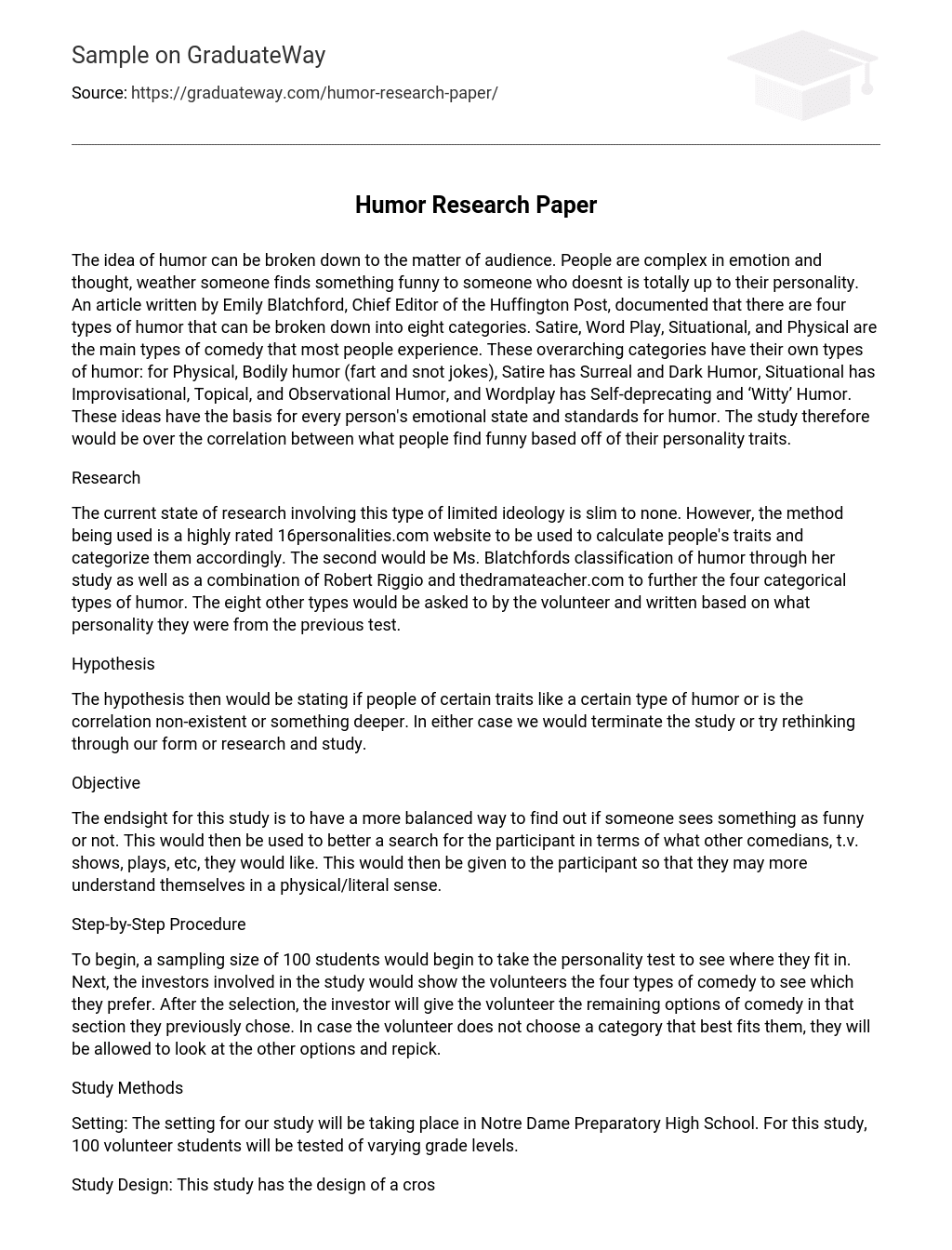The idea of humor can be broken down to the matter of audience. People are complex in emotion and thought, weather someone finds something funny to someone who doesnt is totally up to their personality. An article written by Emily Blatchford, Chief Editor of the Huffington Post, documented that there are four types of humor that can be broken down into eight categories. Satire, Word Play, Situational, and Physical are the main types of comedy that most people experience. These overarching categories have their own types of humor: for Physical, Bodily humor (fart and snot jokes), Satire has Surreal and Dark Humor, Situational has Improvisational, Topical, and Observational Humor, and Wordplay has Self-deprecating and ‘Witty’ Humor. These ideas have the basis for every person’s emotional state and standards for humor. The study therefore would be over the correlation between what people find funny based off of their personality traits.
Research
The current state of research involving this type of limited ideology is slim to none. However, the method being used is a highly rated 16personalities.com website to be used to calculate people’s traits and categorize them accordingly. The second would be Ms. Blatchfords classification of humor through her study as well as a combination of Robert Riggio and thedramateacher.com to further the four categorical types of humor. The eight other types would be asked to by the volunteer and written based on what personality they were from the previous test.
Hypothesis
The hypothesis then would be stating if people of certain traits like a certain type of humor or is the correlation non-existent or something deeper. In either case we would terminate the study or try rethinking through our form or research and study.
Objective
The endsight for this study is to have a more balanced way to find out if someone sees something as funny or not. This would then be used to better a search for the participant in terms of what other comedians, t.v. shows, plays, etc, they would like. This would then be given to the participant so that they may more understand themselves in a physical/literal sense.
Step-by-Step Procedure
To begin, a sampling size of 100 students would begin to take the personality test to see where they fit in. Next, the investors involved in the study would show the volunteers the four types of comedy to see which they prefer. After the selection, the investor will give the volunteer the remaining options of comedy in that section they previously chose. In case the volunteer does not choose a category that best fits them, they will be allowed to look at the other options and repick.
Study Methods
Setting: The setting for our study will be taking place in Notre Dame Preparatory High School. For this study, 100 volunteer students will be tested of varying grade levels.
Study Design: This study has the design of a cross-sectional study. Although the sample consists of students of a similar educational background, the variables will still differ from each participant.
Target and Study Population: There are no exclusion criteria for the study amongst students, all willing volunteers will be included.
Sampling: >gotta talk to doc abt this
Sample Size and Power: >gotta talk to doc abt this
Variables, Definitions and data sources: We will be collecting data on the varying personality types of students at Notre Dame Prep.
Data Collection: https://www.16personalities.com/ Online survey
Data Management: The data was collected from each individual in person based on their survey results. The data is stored on an iPad for future comparison and analysis.
Data Analysis Plan: >talk with doc
Ethical Construction
Limitations: Of course there would be limitations to this project. For starters, the organizing of the personalities limit our ability to how many other kinds of person people can be. As well, the selected groups of comedy could have been broadened.
Overall Work: Each member of the group will gather 25 people to subject to the 16 personalities test, then give them the survey of humor best suits them. Afterwards, the given information collected will be split amongst the group according to our own strengths preference.
Communication: We all communicated as a group during class, and outside of class in a group chat
Group Management: Trevor and Amanda constructed the base of this and assigned roles
Other Aspects of Study: N/A
References
- Blatchford, E., & Blatchford, E. (2017, July 19). There Are Nine Different Types Of Humour. Which One Are You? Retrieved from https://www.huffingtonpost.com.au/2017/07/19/there-are-nine-different-types-of-humour-which-one-are-you_a_23036626/
- By. (n.d.). Types of Comedy for Drama Class. Retrieved from https://thedramateacher.com/types-of-comedy-for-drama-class/
- The 4 Styles of Humor. (n.d.). Retrieved from https://www.psychologytoday.com/us/blog/cutting-edge-leadership/201504/the-4-styles-humor





